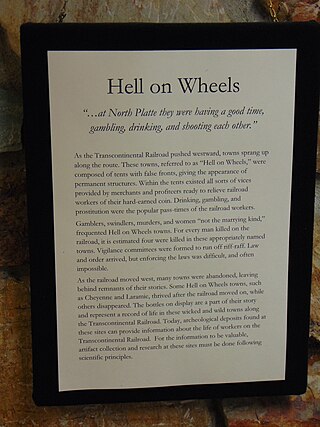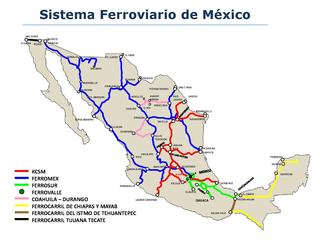Manhattan is the most densely populated borough of New York City.

The Union Pacific Railroad is a Class I freight-hauling railroad that operates 8,300 locomotives over 32,200 miles (51,800 km) routes in 23 U.S. states west of Chicago and New Orleans. Union Pacific is the second largest railroad in the United States after BNSF, with which it shares a duopoly on transcontinental freight rail lines in the Western, Midwestern and West South Central United States.
Mandarin or The Mandarin may refer to:

The Golden Spike is the ceremonial 17.6-karat gold final spike driven by Leland Stanford to join the rails of the first transcontinental railroad across the United States connecting the Central Pacific Railroad from Sacramento and the Union Pacific Railroad from Omaha on May 10, 1869, at Promontory Summit, Utah Territory. The term last spike has been used to refer to one driven at the usually ceremonial completion of any new railroad construction projects, particularly those in which construction is undertaken from two disparate origins towards a common meeting point. The spike is now displayed in the Cantor Arts Center at Stanford University.
Raw is an adjective usually describing:

Los Angeles Union Station is the main train station in Los Angeles, California, and the largest passenger rail terminal in the Western United States. It opened in May 1939 as the Los Angeles Union Passenger Terminal, replacing La Grande Station and Central Station.
The Four Seasons, originally referring to the traditional seasons of spring, summer, autumn, and winter, may refer to:

Hell on Wheels was the itinerant collection of flimsily assembled gambling houses, dance halls, saloons, and brothels that followed the army of Union Pacific Railroad workers westward as they constructed the first transcontinental railroad in 1860s North America. The huge numbers of wage-earning young men working in what was a remote wilderness, far from the constraints of home, provided a lucrative opportunity for business. As the end of the line continually moved westward, Hell on Wheels followed along, reconstructing itself on the outskirts of each town that became, in turn, the center of activity for the Union Pacific's construction work.
The Labyrinth is an elaborate maze in Greek mythology.
Papillon, papillons, or le papillon may refer to:

Mexico has a freight railway system owned by the national government and operated by various entities under concessions (charters) granted by the national government. The railway system provides freight and service throughout the country, connecting major industrial centers with ports and with rail connections at the United States border. Passenger rail services were limited to a number of tourist trains between 1997, when Ferrocarriles Nacionales de México suspended service, and 2008, when Ferrocarril Suburbano de la Zona Metropolitana de México inaugurated Mexico's first commuter rail service between Mexico City and the State of Mexico. This is not including the Mexico City Metro, which started service in 1969.

Union Pacific is a 1939 American Western drama directed by Cecil B. DeMille and starring Barbara Stanwyck, Joel McCrea and Robert Preston. Based on the 1936 novel Trouble Shooter by Western fiction author Ernest Haycox, the film is about the building of the eponymous railroad across the American West. Haycox based his novel upon the experiences of civil engineer Charles H. Sharman, who worked on the railroad from its start in Omaha, Nebraska in 1866 until the golden spike ceremony on May 10, 1869 to commemorate the joining of the Central Pacific and Union Pacific railroads at Promontory Summit, Utah Territory. The film recreates the event using the same 1869 golden spike, on loan from Stanford University.

Kansas City Union Station is a union station that opened in 1914, serving Kansas City, Missouri, and the surrounding metropolitan area. It replaced a small Union Depot built in 1878. Union Station served a peak annual traffic of more than 670,000 passengers in 1945 at the end of World War II, but traffic quickly declined in the 1950s, and the station was closed in 1985.
This page is based on this
Wikipedia article Text is available under the
CC BY-SA 4.0 license; additional terms may apply.
Images, videos and audio are available under their respective licenses.






